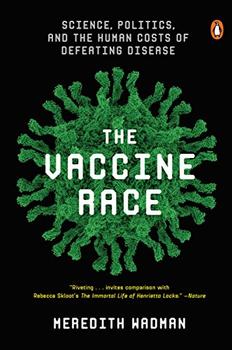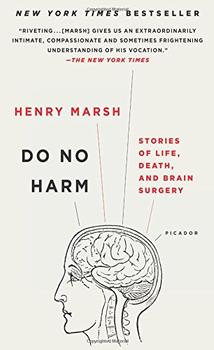Summary | Excerpt | Reviews | Beyond the book | Read-Alikes | Genres & Themes | Author Bio

 Book Reviewed by:
Book Reviewed by:
Kim Kovacs
Buy This Book
The word "Ebola" sets off an almost visceral reaction in many of us; we think about the men, women and children infected by the virus and shudder at its most grisly symptom: blood streaming from every orifice. In 2014, when the largest Ebola outbreak in history began in the West African nations of Guinea, Liberia and Sierra Leone, a single case found in the United States set off a near panic in the country, fueled by media reports about just how deadly and horrific the virus could be. At the height of the epidemic, infectious disease specialist Steven Hatch volunteered, along with other medical personnel, to staff a Liberian Ebola Treatment Unit (ETU) for four weeks; in Inferno he relates his experiences during this crisis.
Hatch's book is very much a personal account, a memoir covering his actions and emotions from his hearing the initial whispers of concern about the impending health crisis to his reception on returning to the United States. He chronicles his barely registering the occasional Ebola-related news report in the early summer of 2014 to his growing awareness that this particular outbreak was larger than any previously seen. He had worked in Liberia as part of his medical training and had friends in the nation, and felt compelled to help in any way he could.
My feeling was that, even if you have a brief experience like mine in Liberia, and those people suddenly find themselves in a major crisis, and you can help them, you must help them. It wasn't noblesse oblige; it was keeping your word. If I failed to help when I could, in their hour of need, then what was my moral worth? Our good name as an institution and my good name as a doctor – my good name as a person – would mean nothing at all if I sat on the sidelines.
One would think that aid organizations dealing with an incredible influx of very ill patients and on the verge of an epidemic would welcome any qualified assistance they could get, but because of the bureaucracy involved and the complexities of mobilizing health workers from many countries, Hatch had to go to great lengths to be considered part of one of the medical teams. It took many international phone calls and emails with coordinating agencies, and careful negotiation with his current employer to ensure other doctors could cover his case load, before he made it out of the United States.
The author details the safety procedures introduced to keep the virus contained. For example, staff members were required to don "Personal Protection Equipment" (PPE) – a full-body, spaceman-like suit that took half an hour to put on – before interacting with patients. Hatch also describes the logistics of dealing with a very ill and highly contagious population, and his day-to-day routine as he tended to the dying. Interestingly, he found that doctors weren't nearly as valuable in the situation as nurses. On the ground, it became much more important to tend to the patients' basic needs and address their fears, which is really what he ended up doing. "I think one of my proudest accomplishments in my career thus far," he writes, "was the night I held a child who needed an IV line, cleaned up the shit of a confused man at the end of his life, handed out medications, and just tried to comfort my patients as best I could."
He also saw an opportunity to collect important medical data about Ebola. Previous outbreaks had been limited to a few hundred individuals and had not heavily involved the international community, and consequently very little sound information was available on the progression of the illness. But even something as simple as collecting data was a challenge; nothing – not even paper – could be taken from the "Hot Zone" where the infected individuals were housed, so Hatch had to be creative. He ended up reading information such as a patient's temperature each hour through the canvas wall to be written down by a technician on the other side.
The subject itself is fascinating from a scientific standpoint; Hatch vividly describes the disease – its history, treatment and prognosis – in a manner that is accessible and interesting. He also delves into the political aspects of Ebola and how its presence impacted both West Africa and the more developed world, and this, too, is quite thought-provoking. His writing is at its best, though, when he describes the people affected by the disease. Part of his job was to review lab results and based on the findings relocate individuals with a positive Ebola test from the "Suspected" area to the "Confirmed" area – the Hot Zone. At times his experiences are heartbreaking; he relays one instance where he had to separate an ill four-year-old girl from her healthy mother, knowing that the child would likely die in the Hot Zone and that she and her mother would never see each other again. As the author himself states in the work's opening sentence, "This is a horror story."
A few pages discuss Liberia's history and the misconceptions held about the country by many Westerners, particularly those in the United States. These sections are important in understanding the nature of the health crisis but they drag a bit. The author is also very critical of some aspects of television news and the U.S. political system that might offend a few politically conservative American readers. Overall, though, Hatch's writing is so descriptive, moving, and involving that most will have a hard time putting the book down.
One needn't be an aficionado of medicine-themed books to enjoy Inferno, which should have wide appeal well beyond the typical non-fiction memoir. I highly recommended it to anyone wishing to learn more about Ebola, and think that book groups in particular will find much to discuss here, given the world-wide implications the contagion has in an age where people are increasingly mobile.
![]() This review
first ran in the May 3, 2017
issue of BookBrowse Recommends.
This review
first ran in the May 3, 2017
issue of BookBrowse Recommends.

If you liked Inferno, try these:

by Meredith Wadman
Published 2018
The epic and controversial story of a major breakthrough in cell biology that led to the conquest of rubella and other devastating diseases.

by Henry Marsh
Published 2016
An unforgettable insight into the countless human dramas that take place in a busy modern hospital, and a lesson in the need for hope when faced with life's most difficult decisions.





The House on Biscayne Bay
by Chanel Cleeton
As death stalks a gothic mansion in Miami, the lives of two women intertwine as the past and present collide.

The Flower Sisters
by Michelle Collins Anderson
From the new Fannie Flagg of the Ozarks, a richly-woven story of family, forgiveness, and reinvention.

The Funeral Cryer by Wenyan Lu
Debut novelist Wenyan Lu brings us this witty yet profound story about one woman's midlife reawakening in contemporary rural China.
Your guide toexceptional books
BookBrowse seeks out and recommends the best in contemporary fiction and nonfiction—books that not only engage and entertain but also deepen our understanding of ourselves and the world around us.